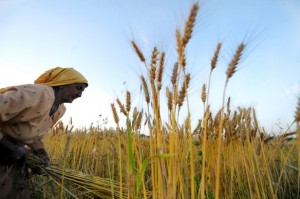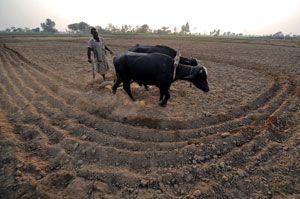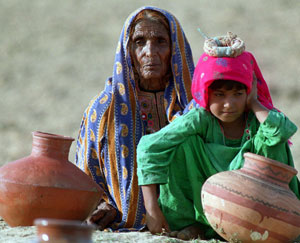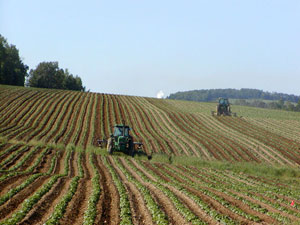Newsline Magazine (Pakistan) | 26 October 2009
By Najma Sadeque
It was the sheer scale of the proposed land lease that shocked Pakistanis to attention. One million acres of Pakistani land were offered to any takers. It was immediately snapped up. The government promptly offered another six million acres.
All this did not happen overnight as the government would have us believe. As it turns out, Prime Minister Yousuf Raza Gillani has been fishing: he had made the offer to the Saudis on a visit in June last year, seeking $6 billion in financial and oil aid in return for hundreds of thousands of acres of agricultural land.
The constant economic jugglery by successive governments has left us with little to repay our burgeoning debt, except perhaps land. But this information was neither shared with the Pakistani public nor discussed in parliament. It seems politicians in Pakistan believe they have carte blanche to take decisions without consulting their constituencies just because they have been elected.
At a 2008 roadshow for Pakistan’s agricultural and dairy sectors in the Gulf region, the vice-chairman and co-founder of the UAE-based Emirates Investment Group, Raza Jafar, openly stated that they had spent some two years researching the agricultural and dairy industries, and exploring the opportunities available. “We have come to the conclusion that agriculture was to represent one of our next major forays in investment.” The government is expecting a Saudi delegation to arrive any day now.
It was the Musharraf government that opened the doors to corporate farming with offers of minimum blocs of 1,000 acres – with no upper ceiling – and decade-long tax holidays. But except for Monsanto, the US-based chemical multinational that now poses as a seed company, entering the country eight years ago to serve agriculture with chemical-dependent genetically modified seeds, there were no takers in the post 9/11 years.
The present government has improved on the Musharraf offer to include 99-year leases and unrestricted repatriation of all profits and produce, and a 100,000-strong security force at a cost of $2 billion to protect these investments (see “Luring Investors”). The media in the Gulf has reported that the Emirates Investment Group and Abraaj Capital of Dubai, among other state and private investors, have already obtained 324,000 hectares (800,621 acres) of Pakistani farmland. Over the past year, Arab investors have been busy acquiring land.
Since the 1970s, the Saudis have been trying to become self-sufficient in wheat – they consume 2.6 million tonnes of wheat a year. But despite the most effective technologies, there is only so much a country can do, especially when water is in such short supply. Nearly 85% of Saudi Arabia’s water was sunk into cereal and dairy farming. But farming proved to be a no-growth area, and finally, Saudi Arabia gave up and started looking for water elsewhere – with the land to go with it.
The truth is, as a World Water Forum report reveals, underground water beneath the Arab countries is depleting rapidly. That includes the Emirates, Bahrain, Kuwait and Qatar. Saudi Arabia is probably the worst hit of all, as its water resources are expected to dry up within the next 50 years. Incidentally, Saudi Arabia, Oman, Kuwait, Bahrain, Qatar and the UAE are expected to reach a combined population of 39 million by next year, according to the Gulf Cooperation Council.
The Gulf states have their own food security issues. They import 60-80% of their food, including most of their staples. But 60-80% of their populations are foreign workers – workers they can’t do without and who have to be fed too. According to the Arab Organisation for Agricultural Development, their food bill jumped from $8 billion in 2003 to $20 billion in 2007. How long could they keep up with these sky-rocketing bills?
The solution seemed to be to grow their food in other countries and ship it directly home from farms owned by them, making it cheaper than imports. This way they would save millions by bypassing world markets. It would bring their food import bill down by 20-25% and also help lower the prices for consumers since they would be bringing their entire production home without sharing any with the host countries.
In fact, Qatar is about to outsource its food production to the Punjab. This will lead to the displacement of as many as 25,000 villages. How does the present government plan to address this issue? Or even the issue of providing enough water for agriculture for foreign investors. Can a water-scarce, hunger-stricken Pakistan afford this? Water – which neither the government nor the investors are talking about, but which is the real reason the Arabs are coming here – will have to be diverted from our farmers, invariably the poorest, who will then be forced to abandon their dried-up, dying lands and join the migrant hordes in our already slum-ringed cities.
The International Institute for Sustainable Development states that this is really a water grab, describing it as “the purchase or long-term lease of land in order to obtain the water rights that come with the land under domestic law or with the investment contract itself.” This explains why the government is being so secretive and not sharing the details with either the public or parliament (who may be forced to share it with the people).
Agriculture claims most of the world’s freshwater – about 70% of what’s available, is used for irrigation. But only between a third to a half of irrigation water reaches crops. The rest mostly leaks into the soil or runs off into water courses carrying agricultural pollutants with it. The worst affected areas are the Middle East (Israel imports all its potable water from Turkey), North Africa, northwest India, northeast China and Pakistan. This factor alone merits Pakistan being stricken off the land grab list.
In August 2008, the international environmental organisation World Wildlife Fund reported that the UK’s rising imports of cotton and rice from Pakistan was draining the aquifers of the fertile Indus Valley much faster than they can be replenished and that very soon, the land will become unproductive. It also expressed concern about the dangers of foreign control over farmlands of poor countries.
The UAE is reportedly about to sign an Memorandum of Understanding (MoU) with the Balochistan government for 150,000 hectares (370,657 acres) near Mirani Dam. Another foreign press report states that earlier the UAE had paid about $40 million for some 40,000 acres in the province – that comes to a thousand dollars per acre. But, if there is resistance, given the insurgency in the province, these land deals could run into trouble. Qatar Livestock is said to have sunk $1 billion into corporate farming in Pakistan. They are simultaneously reported to be negotiating with the Sindh government for leasing lands in Shikarpur, Larkana and Sukkur, and the Punjab government for leasing lands around Mianwali, Sargodha, Khushab, Jhang and Faisalabad, in addition to the NWFP government in search of something suitable. Deals with Bahrain and Qatar are reportedly already in the bag for producing rice for them.
If all these land deals will be beneficial to Pakistan in the long run, why is the government refusing to divulge the details of what is the citizens’ common property?
A Pakistani official, who chose to remain anonymous, said that the investor as well as the Balochistan government will be jointly undertaking infrastructure development worth $20 million to introduce irrigation and improvements. But irrigation provides only short-term solutions and long-term, and often permanent, headaches. Due to inadequate drainage or canal lining, irrigated lands gradually become saline and infertile.
Reportedly, around 60-80% of the world’s irrigated lands may be affected. According to the Russian soil scientist V. Kovda, 20-25 million hectares have already been laid waste worldwide because of badly managed irrigation; 200,000 to 300,000 additional hectares out of a total worldwide irrigated area of about 200 million hectares are abandoned every year due to water logging and salinity.
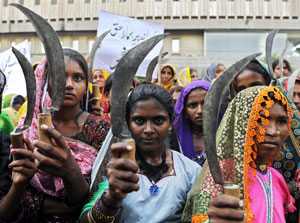
The Food and Agriculture Organisation (FAO) estimates that erosion causes a global loss of five to seven million hectares of productive land a year. Pakistan falls in this category. Georg Bergstrom, author of The Hungry Planet, stated that Pakistan was losing a hectare (two-and-a half acres) of good agricultural land every 20 minutes. Some two million hectares, or one-fifth of the cultivated area of the Indus plains, have been badly affected. As much as 40,000 additional hectares each year are falling victim to water logging and/or salinity, or have ceased to be productive altogether. Various other studies suggest that at least half the water used in agriculture is lost in transit, and sometimes over 60% is lost.
About a third of the world’s irrigated land, including that in Pakistan, is presently in danger. The worst effects of soil corrosion are visible in North America and Europe, where agriculture is heavily subsidised and chemical monoculture has been around longer and pursued to the optimum. A lesson needs to be learnt from the US where some 225 million acres of land is undergoing severe desertification. It would not be difficult for experts to guesstimate the level of soil corrosion within half a decade of intensive industrial farming in Pakistan.
The Indus irrigation system has negatively affected the hydrological balance of the Indus River basin and is rapidly deteriorating. It risks being consigned to failure if drastic action is not taken soon. It presently accounts for 90% of the agricultural output, but that may drop when foreign investors come in and expand the system further.
It is, therefore, difficult to understand how the Ministry of Investment got into an activity more akin to disinvestment. It is suicidal to divest the country of its natural capital. Whatever investment is poured into the lands will be for the exclusive benefit of the investor, not Pakistani citizens, or the generations that will follow.
The Green Revolution fizzled out in less than a decade. And it will not take a 49-year lease, let alone a 99-year one, for Pakistan’s fragile soils to be worked to death by the corrosive effects of chemical monoculture and genetically modified seed. In a decade or less, there is a grave danger that investors will have used intensive technologies to wrest out the maximum possible yields leaving the land so degraded, they will have to move out in search of new pastures.
Government spokesmen keep harping on the fact that the land is being leased, not sold. But the land will not be worth repossessing once it is exploited to the hilt. Further, it is easy enough for buyers/lessors to protect their investments with investor-protection provisions of international trade pacts and bilateral investment treaties, even to the extent of preventing cancellation of unfair land deals or stopping unsustainable or exploitative activities.
In fact, investors can even sue for imagined non-compliance of agreement, such as short supply of water, even if the host country is over-generous and depriving its own people.
The Saudi plan is to set up a series of 100,000-hectare (247,000-acre) farms in various countries to produce its crops of choice, such as wheat, corn, rice and soybeans, as well as fodder.
The Gulf states are a step ahead. Together they ostensibly manage $5 billion in assets across the Middle East, South Asia and North Africa. Apparently, the Abu Dhabi Group, the single-largest foreign direct investor in Pakistan, the Emirates Investment Group and Abraaj Capital, a Dubai-based investment firm, have made known their interest in our agricultural sector and may be among those who have already clinched their deals.
Another argument the government keeps forwarding is that it is releasing marginal or unused land simply because it is not being operated by any landlord and does not appear in land records. Such land is part of the shaamlaat or community lands, which, although technically not owned by anyone, is by customary rights entrusted to the collective responsibility of local communities. These communities are responsible for justly sharing the produce and protecting it from overexploitation. Food and medicinal herb collection from wild plants still exists in many parts of South America, Africa and Asia, including parts of Pakistan. Land is also needed by herders or gypsies for grazing their animals.
Most importantly, lands that are sparsely populated because of water constraints are the very places where the hardiest wild species have evolved to withstand the harshest environmental conditions. These flora draw corporate gene-hunters to search them out so their survival traits can be transferred to other plants. These are then flaunted as the new ‘man-made’ species that are appropriated for sole global control and sale under intellectual property rights regimes.
Even if the Arab investors are not looking for fresh geneplasm and patents, the introduction of a few crops on vast monoculture plantations will wipe out, once and for all, the rare biodiversity that is left there, depriving our own farmers and scientists of genetic material.
What our ‘hands-off’ economists and urban experts have yet to absorb is that if monocultures take 100% hold, and there are no wild genes left to replenish weakened stock, agriculture will soon die and, along with it, people and other forms of life.
Jacques Diouf, director-general of FAO, has warned against creating a food neocolonialism, with richer countries obtaining supplies at the expense of poor farmers. For example, in Ethiopia, one of the world’s poorest countries where people are starving, some 1.5 million acres have been leased out for a mere $3-10 per hectare per year. The average landholding size being five acres, over 300,000 families are displaced. Only about 20,000 people or so may get jobs in the highly mechanised farms.
That the Arab countries need to ensure their food security is understandable, but it does not have to be at the cost of countries like Pakistan that still need to set their own agricultural house in order to feed the starving in their own backyards.

